Small Conference and Section Fund Grant Past Winners' Stories
2022: Jack Morgan, King's College London
"The Young Embryologist Network (YEN) are tremendously thankful for the generous funding received from the Society for Experimental Biology (SEB) in 2022. As YEN co-chair (2021-22) I would like to extend my thanks to the SEB on behalf of the entire committee and share some thoughts and reflections on what we were able to achieve thanks in part to our SEB small conference award.
YEN is an academic body run by early career PhD students and postdocs across various universities and research institutes in the UK. Each year we (the committee) hold a one-day conference on a general theme of developmental biology and, to promote accessibility, our conference is free to attend. This is enabled by funding from our sponsors, such as the SEB, and delegates attend from all over the globe.
YEN 22 took place at the Francis Crick Institute on the 16th of May 2022 and marked the 14th iteration of our yearly conference. Our varied and exciting programme included invited talks by Dr. Kate McDole (MRC LMB) and Dr. Andrew Gillis (Woods Hole), with Prof. Elly Tanaka (IMP, Vienna) delivering our keynote address: “the Sammy Lee memorial lecture”. These featured alongside the usual programme of selected short talks and poster presentations from postdocs and students, with further opportunities to network in a diverse and engaging setting.
However, I would particularly like to highlight our “Working in science with a disability” feature at YEN 22. Disability is a tremendous barrier not only to entry, but also to the progression of a scientific career, and researchers with disabilities remain immensely underrepresented at every career stage. Our community could be much better equipped in helping ensure equal opportunities for disabled scientists, and so we sought to draw attention to this by hosting talks from Prof. John Hutchinson, RVC; Dr. Elisabeth Kugler; Dr. Oscar Cazares, UCSF; who shared their experiences of working in science with a disability across the breadth of career stages, offering insight on how we can make improvements for inclusivity in future.
Continuing the theme, we rounded off the day with Dr. Cynthia Andoniadou giving a thoughtful summary address, before offering final thoughts and opening to floor to a productive and open discussion. Post-event, we gathered feedback via survey. The response was overwhelmingly positive, with both the scientific and science-adjacent merit of the meeting highlighted throughout. Thus, we consider the meeting to have been a success.
Furthermore, our disability inclusivity sessions picked up significant momentum within the developmental biology community and, having entered talks with the British Society for Developmental Biology (BSDB), I am pleased to share that a disability support grant has now been established. One of, if not the first, of its kind in our field, the grant aims to offset any costs due to disability incurred by attendees of BSDB conferences.
Hence, the continued and sustained support of student and postdoc-led initiative such as YEN are not only enriching and essential to the career development of junior scientists, but also inspires and enables positive change to be enacted throughout our community. Again, this is not possible without generous funding from supportive organisations such as the SEB and we are truly thankful to have had the opportunity."
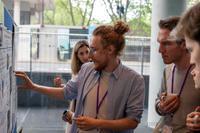

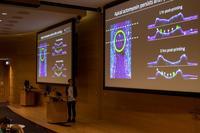
2019: Dr. Charlotte Walker, University of York
"I was awarded a small grant to run Plastid Preview 2019 hosted at the Mackinder Lab, University of York. Plastid Preview a small annual meeting for early career researchers interested in all aspects of plastid biology. There is a focus on inclusivity, it's free for early career researchers to attend and all participants contribute either a poster or talk. As the lead organiser I gained valuable experience in writing grant applications for event funding, organising the event itself and interacting with my colleagues.
I was a postdoctoral researcher when I organised Plastid Preview 2019 and I am now a BBSRC Discovery Fellow (started 2022). I included my experience as lead organiser and the funds I secured to facilitate Plastid Preview 2019 in my fellowship application and discussed this experience during the interview process.
I'm very grateful to the SEB for awarding us the money to run such a great meeting. The whole process was extremely positive and has directly benefitted my career development and exposure within my research community."
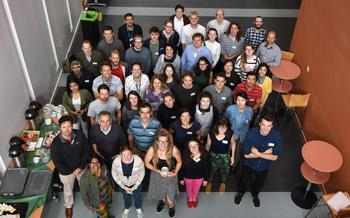
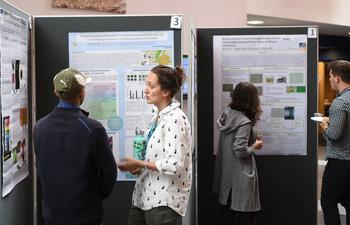
2018: Professor Miriam Gifford, University of Warwick
"I received the grant in order to fund early career talk and poster prizes at The 1st International Plant Systems Biology meeting 2018 (Roscoff, France). We were delighted that SEB was able to support the meeting by providing £1000 to be used for early career scientist prizes. There were four £150 prizes for the best talks and four £100 prizes for the best posters by PhD students or early postdoctoral researchers.
The meeting was extremely successful. The support helped create a supportive and encouraging atmosphere at the meeting, spurring on a new community of plant systems biologists (leading to a 2nd meeting in 2021, and another planned for 2024)."
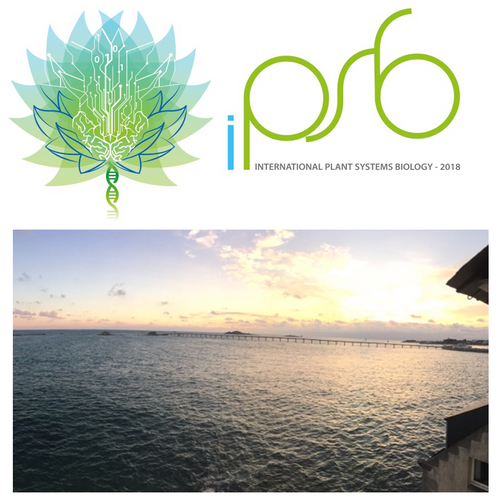
2018: Professor Elizabete Carmo-Silva, Lancaster University
The Conference Plastid Preview 2018 was held at the Lancaster Conference Centre, Lancaster University, on the 3rd-4th September, and it was a great success. There were 60 attendees, bringing together researchers from 13 universities in the UK, as well as one from the University of Silesia in Katowice, Poland. We had 50 early career researchers (ECRs), 7 PIs and representatives from 3 organisations (New Phytologist, ASPB, Li-Cor Biosciences). The programme consisted of 20 talks and 18 posters supplemented with flash talks, all of which described great research and were presented to a very high standard. Prizes of £50 each were awarded to the Best Poster (Charlotte Walker, University of York) and Best Talk (Laura Wey, University of Cambridge), as judged by the PIs attending the conference.
This meeting has always been an excellent opportunity for ECRs to meet and foster networks with their peers and some senior scientists. This year, additional effort was made to ensure that all the attending ECRs had the opportunity to contribute actively to the meeting. We invited ECRs to chair the 6 seminar sessions. Mary Williams (ASPB) and Mike Whitfield (New Phytologist) gave talks on how ECRs can best promote themselves and their science, including running an excellent and fun interactive activity. We asked delegates to provide feedback on the meeting and 40 people responded through a quick online survey. Feedback was very positive with attendees appreciating the chance to participate active in a supportive environment and network with their peers, and left the meeting feeling more confident about discussing and presenting their work.
A wide range of topics covering plastid biology research were showcased throughout the meeting:
• Gas-exchange measurement and crop photosynthesis (Rakesh Tiwari, Leeds; Alexandra Burgess, Nottingham)
• Using natural variation to improve photosynthesis (Gustaf Degen, Lancaster; Lorna McAusland, Nottingham; Cristina Sales, Lancaster)
• Plastid biogenesis and evolution (Rona Costello, Oxford; Monika Gajecka, Silesia)
• Retrograde signalling (Jon Griffin, Lancaster; Robyn Phillips, Cambridge)
• Carbon concentrating mechanisms (Conor Simpson, Cambridge; Nicky Atkinson, Edinburgh; Indu Santhanagopalan, Cambridge)
2017: Bert De Rybel, Ghent University
"The President’s Medal award came right at the moment when I was starting my own independent research group in 2017. The invited lecture at the Annual Meeting and the associated exposure were for sure great experiences which helped to establish the team. Since then, the group has grown considerably and new faces appeared, but we are still trying to understand how plant cell control the orientation of their cell divisions within the context of vascular development."

2017: Simon Morley, British Antarctic Survey
"The grant from SEB helped to sponsor the Physiomar conference led by Simon Morley (British Antarctic Survey) and Doris Abele (Alfred Wegener Institute), for 4 days in Magdalene College, University of Cambridge, England (18-21 September 2017). This was the fifth in the international series of Physiomar conferences with 68 delegates from 13 countries attending, 53 oral and 18 poster presentations focussed on the physiology of aquatic ectotherms in a changing world. Sponsorship, was essential to maintain reasonable costs and, in particular, for a discounted registration fee to be charged for students. Organising the conference with Doris resulted in me being invited to co-lead a work package in the EU Rise program CoastCarb. The conference also allowed me to develop collaborative project ideas with Jorge Navarro from Valdivia, in Chile, and his large Chilean sub-Antarctic/Antarctic project IDEAL. Both these projects have helped to further develop strong South American collaborations."

The candlelit conference dinner in Magdalene College hall
